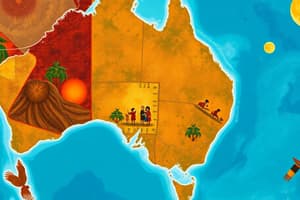Podcast
Questions and Answers
Which country is the world's smallest continent and the 6th largest country?
Which country is the world's smallest continent and the 6th largest country?
- United States
- Australia (correct)
- Brazil
- New Zealand
Who navigated and mapped Australia, claiming it for Great Britain?
Who navigated and mapped Australia, claiming it for Great Britain?
- Ferdinand Magellan
- Christopher Columbus
- Captain James Cook (correct)
- Marco Polo
Why is the Union Jack on Australia's flag?
Why is the Union Jack on Australia's flag?
- To symbolize the Aborigines
- To honor Captain James Cook
- Due to Australia's British heritage (correct)
- To represent the Southern Star
Which city is the capital of Australia?
Which city is the capital of Australia?
Who were the first people to live in Australia?
Who were the first people to live in Australia?
'Slip on a shirt, Slop on sunscreen, Slap on a hat, Seek shade, Slide on Sunnies' campaign in Australia aims to prevent:
'Slip on a shirt, Slop on sunscreen, Slap on a hat, Seek shade, Slide on Sunnies' campaign in Australia aims to prevent:
Flashcards are hidden until you start studying
Study Notes
Australia Facts
- Australia is the world's smallest continent and the 6th largest country.
Discovery and Colonization
- Australia was navigated and mapped by Captain James Cook, who claimed it for Great Britain.
National Flag
- The Union Jack is on Australia's flag because of the country's historical link to Great Britain.
Capital City
- Canberra is the capital of Australia.
Indigenous Peoples
- The Aboriginal and Torres Strait Islander peoples were the first to live in Australia.
Health Campaign
- The 'Slip on a shirt, Slop on sunscreen, Slap on a hat, Seek shade, Slide on Sunnies' campaign in Australia aims to prevent skin cancer and promote sun safety.
Studying That Suits You
Use AI to generate personalized quizzes and flashcards to suit your learning preferences.




